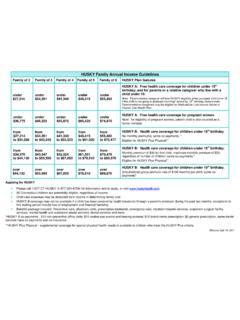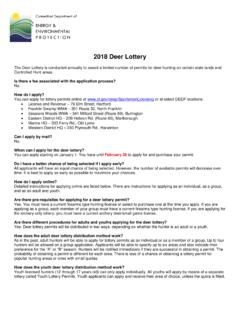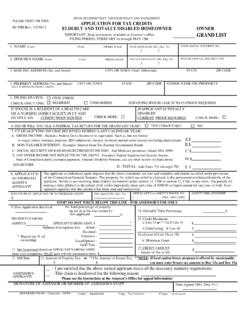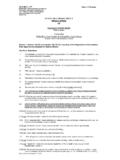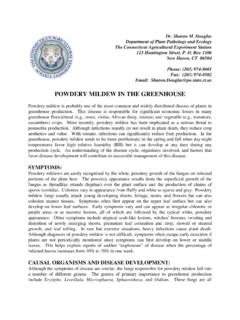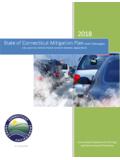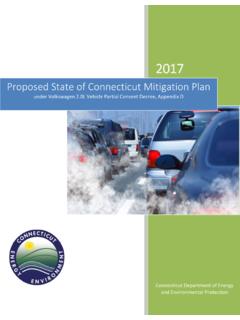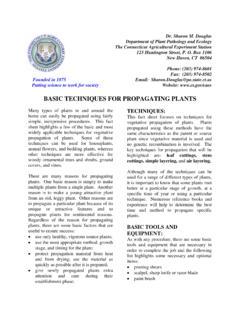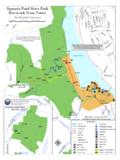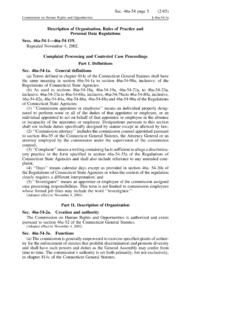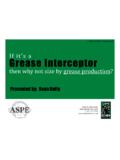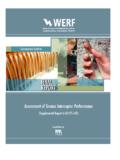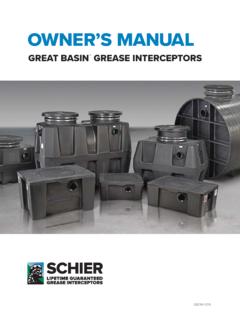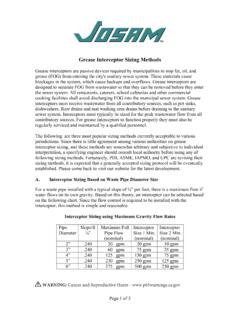Transcription of Environmental Permitting Fact Sheet - CT.GOV …
1 Environmental Permitting fact Sheet General Permit for the Discharge of Wastewater Associated with Food Service Establishments (2015 Reissue) Why Fats, Oil and grease (FOG)? grease from restaurants, homes, and industrial sources is the most common cause (47%) of reported blockages and sanitary sewer overflows (SSO). grease is problematic because it solidifies and causes blockages in the sewer collection system. Raw sewage overflows result in public health risks and negative impacts to waterways. Permit Overview The General Permit for the Discharge of Wastewater Associated with Food Service Establishments (Fats, Oil and grease or FOG General Permit) was reissued on October 5, 2015. The permit requires certain dischargers to municipal sewer systems to limit the amount of FOG of all Class III and IV food service discharges by installing either an outside grease trap/ interceptor , an Active grease Recovery Unit (AGRU), or Super-capacity grease interceptor (SCGI) in accordance with technical requirements specified in the general permit.
2 The authorized agent approves the FOG management equipment to be installed. Kitchen fixtures and drains as specified in the general permit shall be connected to the FOG management equipment. Pollution prevention and best management practices are also required of the permittee including quarterly inspections of the installed equipment and pump-outs of the passive grease interceptor at least every three months. Recovered fats, oils, and grease shall be disposed of at a regional collection/transfer/disposal site. Authorizing Statutes Section 22a-430b of the Connecticut General Statutes. Renewal of General Permit The changes in current general permit don t expand the coverage of the permit. The changes provide increased clarity in the permit. The changes in the permit provide flexibility on equipment requirements.
3 New and Revised Definitions: Some definitions have been modified, and some new terms added, to provide enhanced clarity in regards to responsibilities of the municipalities and Food Service Establishments (FSE). Active grease Recovery Unit (AGRU) means an interior grease interceptor that separates grease from the wastewater by active mechanical or Connecticut Department of Energy & Environmental Protection Bureau of Water Protection and Land Reuse Planning and Standards Division Municipal Wastewater Program DEEP-WATERP&S-FS-001 1 of 3 Rev. 10/26/15 electrical means The word active was chosen to replace automatic to clarify that the AGRU has a skimming device (automatic) that collects the FOG in a disposal vessel at the side of the unit. Food service establishment owners assumed that the unit didn t have to be maintained because the unit performs automatically.
4 The collected FOG must be disposed in an outdoor FOG storage container and taken away for processing into a fuel, or be recycled or reused by approved FOG receiving facility. The AGRU has to be maintained and operated in accordance with manufacturer s specifications. Authorized Agent means a representative of the water pollution control authority or the authorized representative of the municipality. FOG Management Equipment All FOG management (active grease recovery unit, grease trap/ FOG interceptor and super-capacity grease interceptor ) equipment must be approved by the authorized agent, and design to meet the effluent limits of the permit. Food Service Establishment means a Class III and IV FSE as defined by section 19-13-B42 of the State of Connecticut Public Health Code or any other facility discharging fats, oil and grease above the effluent limits in Section 5(c)(1) and (2) of this general permit.
5 The modification was done to be consistent with current regulatory language with the CT Public Health Code. grease trap/FOG interceptor The definition refers to the outdoor, (the word indoor was removed) in-ground (added) passive unit designed to separate fats, oils and grease from wastewater allowing water to flow through and meets specifications defined in section 5(b)(1) of this general permit. It refers to larger, precast, concrete tanks, installed outdoors, that are similar to septic tanks, installed outdoors, that are similar to septic tanks in appearance, and require regular pumping out. Super-capacity grease interceptor (SCGI) means an indoor or outdoor passive unit, third-party certified to retain more than four times the amount of pounds (lbs) of grease than the flow rating in gallons per minute (GPM) and is designed to separate fats, oils, and grease from wastewater while allowing water to flow through and meets specs defined in section 5(b)(3) of this general permit.
6 SGIs takes up less space than the grease trap/FOG interceptor . Clarifications and Enhancements: The proposed modifications to the general permit will allow the permittee to choose from a wider range of equipment including (AGRU, grease trap/FOG interceptor or the SCGI). All FOG management equipment must be approved by the authorized agent, and designed to meet the effluent limits of the permit. The grease trap/FOG interceptor , AGRU and SCGI shall be installed to service kitchens flows and shall be connected to those fixtures or drains which would allow, fats, oils and grease listed in Section 5 (b)(1)(A) except the dishwasher. When the dishwasher discharge passes through the FOG management equipment, the hot water from DEEP-WATERP&S-FS-001 2 of 3 Rev. 10/26/15 the dishwasher can dissolve the grease and the soap emulsifies the FOG in the FOG management equipment and can cause blockages after the grease solidifies at the pipe.
7 The Authorized Agent has the authority to require increased maintenance and cleaning if the facility is within an area where FOG has been a recurring problem in the sewerage system. The permittee is responsible for properly handling the storage of FOG, and is responsible for hiring a "FOG hauler which means any person or entity regularly offering to the general public the transport of FOG to a FOG receiving facility for proper recycling, reuse, or disposal. The list of FOG receiving facilities will posted and the DEEP s website. All FOG containers shall be clearly labeled. The contents of all FOG management equipment shall be properly recycled or disposed. A range of options for proper recycling or disposal, both within and outside Connecticut, are identified. Permit Duration In accordance with [citation] this general permit shall be valid for a period of ten (10) years from the date of issuance.
8 Staff Contact Iliana Raffa 860-424-3758 or Contact Address MUNICIPAL WASTEWATER PROGRAM PLANNING AND STANDARDS DIVISION DEPARTMENT OF ENERGY AND Environmental PROTECTION 79 ELM STREET HARTFORD, CT 06106-5127 This overview is designed to answer general questions and provide basic information. You should refer to the appropriate statutes and regulations for the specific regulatory language of the different permit programs. This document should not be relied upon to determine whether or not an Environmental permit is required. It is your responsibility to ensure that all required permits have been obtained. DEEP-WATERP&S-FS-001 3 of 3 Rev. 10/26/15
